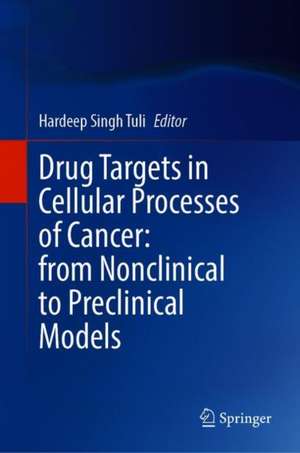Drug Targets in Cellular Processes of Cancer: From Nonclinical to Preclinical Models
Editat de Hardeep Singh Tulien Limba Engleză Hardback – oct 2020
| Toate formatele și edițiile | Preț | Express |
|---|---|---|
| Paperback (1) | 712.81 lei 6-8 săpt. | |
| Springer Nature Singapore – 2 oct 2021 | 712.81 lei 6-8 săpt. | |
| Hardback (1) | 717.20 lei 3-5 săpt. | |
| Springer Nature Singapore – oct 2020 | 717.20 lei 3-5 săpt. |
Preț: 717.20 lei
Preț vechi: 754.95 lei
-5% Nou
Puncte Express: 1076
Preț estimativ în valută:
137.23€ • 143.67$ • 113.55£
137.23€ • 143.67$ • 113.55£
Carte disponibilă
Livrare economică 15-29 martie
Preluare comenzi: 021 569.72.76
Specificații
ISBN-13: 9789811575853
ISBN-10: 9811575851
Pagini: 228
Ilustrații: XIII, 228 p. 28 illus., 26 illus. in color.
Dimensiuni: 155 x 235 mm
Greutate: 0.45 kg
Ediția:1st ed. 2020
Editura: Springer Nature Singapore
Colecția Springer
Locul publicării:Singapore, Singapore
ISBN-10: 9811575851
Pagini: 228
Ilustrații: XIII, 228 p. 28 illus., 26 illus. in color.
Dimensiuni: 155 x 235 mm
Greutate: 0.45 kg
Ediția:1st ed. 2020
Editura: Springer Nature Singapore
Colecția Springer
Locul publicării:Singapore, Singapore
Cuprins
Chapter 1. History of oncotherapies in cancer biology.- Chapter 2. Electrochemical Sensors and Biosensors for the Detection of Cancer Biomarkers and Drugs.- Chapter 3. Cell cycle arrest: An impending therapeutic strategy to curb cancer.- Chapter 4. Apoptotic cell death: important cellular process as chemotherapeutic target.- Chapter 5. Regulatory roles of autophagy in cancer.- Chapter 6. ROS and Oxidative Stress in Cancer: Recent Advances.- Chapter 7. Inflammatory mediators: Potential drug targets in cancer.- Chapter 8. Pharmacologic modulation of the immune response against tumours in the elderly. Chapter 9. Angiogenesis: A Therapeutic Target for Cancer.- Chapter 10. Metastasis: A major driver of cancer pathogenesis.- Chapter 11. Designing Personalized and Innovative Novel Drug Therapies For Cancer Treatment.
Notă biografică
Dr. Hardeep Singh Tuli is an Assistant Professor at the Department of Biotechnology, Maharishi Markandeshwar (Deemed to be University), Mullana Ambala. He previously served as a Lecturer at the Department of Applied Sciences, Institute of Science and Technology, Klawad, Yamunanagar (2009-2011), India. His research interests are focused on the isolation, characterization and biochemical evaluation of natural metabolites as anticancer agents. He has served as a reviewer for several international journals, and as a guest editor for the journal Frontiers in Pharmacology. He has more than 9 years of teaching and research experience in pharmacology, mammalian physiology, and natural products. He has published more than 70 papers in peer-reviewed international journals and authored a number of book chapters. In addition, Dr. Tuli is editorial board member of various national and international scientific research journals.
Textul de pe ultima copertă
This book explores potential cellular drug targets for cancer therapy. The first couple of chapters describe conventional treatment (radiotherapy, chemotherapy, and immunotherapy) & detection (biosensors) strategies for cancer. In contrast, the subsequent chapters address the role of cyclin-dependent kinases and cell cycle regulatory proteins in the growth of cancer cells and their potential as target for cancer treatment. The book then discusses the regulation of various pro-apoptotic and anti-apoptotic proteins via chemotherapeutic drugs. In addition, it examines the molecular mechanisms that are critical for mediating autophagic cell death in cancer cells. It subsequently reviews the role of reactive oxygen (ROS) species during carcinogenesis and during chemotherapy, and the potential of anti-inflammatory routes for the development of new therapeutic modulators. Lastly, it describes therapeutic strategies that target the tumor microenvironment and various angiogenic pathways for thetreatment of cancer and to develop personalized medicine. Given its scope, the book is valuable resource for oncologists, cancer researchers, clinicians, and pharmaceutical industry personnel.
Caracteristici
Explores various cellular targets for cancer therapy Reviews the role of inflammatory molecules and reactive oxygen species as potential targets for drug development Examines the potential of apoptotic and autophagy pathways as targets for anticancer therapy Analyzes the tumor microenvironment and angiogenesis pathway as potential targets
